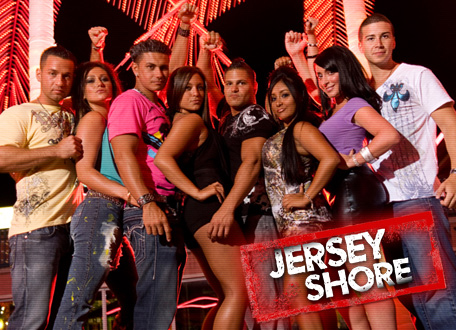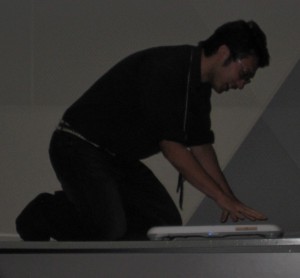Video: English Teachers – The Series
Thanks to JET alum Jennifer Wang for forwarding the link to “English Teachers: The Series,” an original web-based comedy series about teaching English in Japan. (Kind of like Scrubs if it took place in a private English school.)
http://englishteachersseries.com
Here’s the first episode. Click the above link to see more episodes:
WIT Life #137: Tokyo Sky Tree
WITLife is a periodic series written by professional Writer/Interpreter/Translator Stacy Smith (Kumamoto-ken CIR, 2000-03). She starts her day by watching Fujisankei’s newscast in Japanese, and here she shares some of the interesting tidbits and trends together with her own observations.
Very interesting article in yesterday’s NYT about how efforts are being made to reduce the presence of yakuza in various business transactions. The story focuses on the recent construction project of Tokyo Sky Tree, a communications tower. This is a huge change as traditionally yakuza have been an integral part of this industry, often seeking “protection money” from developers. Developers might also call on the yakuza to give an extra push to people unwilling to give up their land. I liked Jake Adelstein‘s quote calling the yakuza “Goldman Sachs with guns.” Check out the adjoining picture to see a comparison between Tokyo Tower and the “new Tokyo Tower,” what Sky Tree was called before decided on its official name. Other candidates were Tokyo Edo Tower, Mirai (Future) Tree, Yume Miyagura (Dreamwatching Tower), Rising East Tower and Rising Tower. It is due to be completed next year.
Longest Japan Series game in history ends in 15-inning tie
Were any JET alums at this game?
Here’s the article from the Daily Yomiuri: http://www.yomiuri.co.jp/dy/sports/20101107dy01.htm
Editor’s Note: Dragons ganbare!
Japan Trends: “Jersey Shore” to air in Japan, titled “Macaroni Rascals”
 This CNN story on Jersey Shore as the latest U.S. pop-culture import to Japan and how the title translates loosely as “Macaroni Rascals.”
This CNN story on Jersey Shore as the latest U.S. pop-culture import to Japan and how the title translates loosely as “Macaroni Rascals.”
http://www.cnngo.com/tokyo/none/macaroni-rascals-mtvs-jersey-shore-comes-japan-490032
Here’s the official title:「MTV Jersey Shore〜マカロニ野郎のニュージャージー・ライフ〜」And CNN just decided to translate “yaro” as “rascals” to keep the story family friendly, but they acknowledge that the term could be translated less politely.
If anyone watches this in Japan, first, I’m very sorry. And second, JetWit would love to hear about reactions from some of your Japanese friends and colleagues.
WITLife is a periodic series written by professional Writer/Interpreter/Translator Stacy Smith (Kumamoto-ken CIR, 2000-03). She starts her day by watching Fujisankei’s newscast in Japanese, and here she shares some of the interesting tidbits and trends together with her own observations.
Many readers probably caught yesterday’s NYT cover story with the headline “Japan Goes from Dynamic to Disheartened.” This article (“Coping with Decline”) is the first in a series called The Great Deflation which will “examine the effects on Japanese society of two decades of economic stagnation and declining prices.” Throughout the article all those quoted mention a “lack of vigor/vitality” (I assume this was a translation of 元気がない (genki ga nai)). Read More
WIT Life #131: Asian Collaboration
*****************************************************************************
WITLife is a periodic series written by professional Writer/Interpreter/Translator Stacy Smith (Kumamoto-ken CIR, 2000-03). She starts her day by watching Fujisankei’s newscast in Japanese, and here she shares some of the interesting tidbits and trends together with her own observations.
Yesterday I attended the first ever Japan & Korea Block Fair, which was held on Broadway between 93rd and 94th streets. It was sandwiched between other festivals offering your standard street fare of zeppoles and gyros, but the Asian section seemed to be getting the most foot traffic. One side featured Japanese food such as okonomiyaki and yakitori, and the other had Korean food like bulgolgi and kimchi.
My friend and I shared many different samples, but my favorite was Read More
WIT Life #130: Nobel Prize honors
WITLife is a periodic series written by professional Writer/Interpreter/Translator Stacy Smith (Kumamoto-ken CIR, 2000-03). She starts her day by watching Fujisankei’s newscast in Japanese, and here she shares some of the interesting tidbits and trends together with her own observations.
Japanese professors 75-year old Eichi Negishi of Purdue University and 80-year old Akira Suzuki of Hokkaido University received news this week that they had won the $1.5 million 2010 Nobel Prize in Chemistry for their work on organic synthesis. This chemical method allows scientists to test cancer drugs and make thinner computer screens, and it is one of the most sophisticated tools available today. They share this honor with 79-year old American Richard Heck of the University of Delaware, but the three recipients worked entirely independently of each other, an unusual situation for joint winners.
Negishi shared that he started dreaming about winning the prize when Read More
Tom Baker covers the 2010 Tokyo Game Show
Tom Baker (Chiba-ken, 1989-91) is a staff writer for The Daily Yomiuri. As another example of JET ROI, he is one of at least four former JETS to have been on the newspaper’s staff in recent years. He usually writes for DYWeekend, the arts and leisure section. You can follow Tom’s blog at tokyotombaker.wordpress.com.
Earlier this month he covered the Tokyo Game Show, Japan’s biggest video game industry trade show. His story focused on new motion-sensing control systems from Sony and Microsoft, and also on innovative games by indie creators such as Minori Yokota (shown in the photo). Here is an excerpt:
Some of the freshest and most radically creative offerings at this year’s Tokyo Game Show were part of the Sense of Wonder night, a showcase for innovative indie games from Japan and overseas.
 Minori Yokota, a graduate student at Kanagawa Institute of Technology, declared that he “hates” dating simulation games, which surprised the audience who watched him demonstrate a game called Love Press++: Massage for Your Truelove that he developed together with Prof. Akihiro Shirai and fellow student Taisuke Yamashita.
Minori Yokota, a graduate student at Kanagawa Institute of Technology, declared that he “hates” dating simulation games, which surprised the audience who watched him demonstrate a game called Love Press++: Massage for Your Truelove that he developed together with Prof. Akihiro Shirai and fellow student Taisuke Yamashita.
The game uses a Wii balance board to represent the torso of an imaginary woman, whom the player massages. As Yokota pressed and kneaded, a recording of a voice actress sighed, squealed and cooed–until he rubbed her the wrong way, when she scolded him for his clumsiness.
Humor of a blacker sort was seen in Ulitsa Dimitrova, a German cartoon simulation of the life of a homeless child, while MusicMineSweeper is a whimsical Japanese game that makes music based on the semirandom patterns players create in the popular Minesweeper game.
Players of Record Tripping, by American creators John and Dan Bell, use the scroll wheel of a computer mouse to scratch a record, deejay-style. Then, the same motion is used to contol the rotation of other round objects, such as a windmill, a clock face and safe’s combination dial, with each phase of the game having a different objective.
The youngest presenter was 17-year-old Mahdi Bahrami from Iran, whose elegant Everything Can Draw! uses lines to trace the paths of moving objects. He said he was inspired to create it in geometry class.
Such games might seem to offer hope in a sequel-swamped gaming world, but when a member of the audience asked Bahrami if he intended to pursue a career in video games, the whiz kid gave a one-word answer: “No.”
Read the full article here.
WIT Life #126: Dominance of video games and shared waters
***********************************************************************************
WITLife is a periodic series written by professional Writer/Interpreter/Translator Stacy Smith (Kumamoto-ken CIR, 2000-03). She starts her day by watching Fujisankei’s newscast in Japanese, and here she shares some of the interesting tidbits and trends together with her own observations.
Today’s NYT has two articles about Japan’s technology and relations with China. In the former, Hiroko Tabuchi discusses how the country’s once dominance of video games has been overtaken by Western game developer advances. The one exception is Nintendo, who has found great success with its Wii, but other companies are struggling in terms of economic resources and cultural understanding of what appeals to the international market (There is a growing gap in game styles between Japan and the West). Interestingly enough, in order to appeal to a global audience some video games are being written in scratch in English as opposed to relying on awkward translations from the original Japanese. The questions remains as to whether Japan can still produce star characters who can become the next Mario or Sonic.
On the political side, the second article talks about a dispute between Read More
WITLife is a periodic series written by professional Writer/Interpreter/Translator Stacy Smith (Kumamoto-ken CIR, 2000-03). She starts her day by watching Fujisankei’s newscast in Japanese, and here she shares some of the interesting tidbits and trends together with her own observations.
Today’s NYT has a flurry of articles about Japan’s politics and economy. First of all, PM Kan survived the challenge to his leadership and handily defeated Ozawa with 721 votes to his 491. Everyone can breath a collective sigh of relief knowing that the PM will not be changing yet again.
On the economic side, Hiroko Tabuchi gives us two articles about the strong yen and its implications. One discusses the measures the government has taken to weaken it, intervening in foreign markets for the first time since 2004. The other talks about how the strong yen has provided an opportunity for Japanese companies to go a shopping spree purchasing foreign companies, such as Rakuten’s recent acquisition of Buy.com. Happy reading!
Commentary: “The Cove is a Total Failure”
Here’s a blog post from Ryan Cecil Smith (Hyogo-ken, Nishinomiya-shi, 2010) about his attempts to show the controversial documentary film The Cove to students in his town of various age ranges in an effort to foster discussion and reaction.
Here’s the post: http://ryancecilsmith.com/blog/the-cove-is-a-total-failure
Here’s a quote from Ryan’s blog post:
“I think that there should be some reckoning by the makers of The Cove for how poorly the movie has been received in Japan. I’m really disappointed that the movie is targeted so far from a Japanese audience, even though the point of the movie is ostensibly to change a Japanese practice.”
Ryan is very interested in hearing reactions and comments from the JET and JET alumni communities as well as from any other readers. Please feel free to comment below.
You can find additional commentary about The Cove on JetWit here and here.
WIT Life #124: 自殺防止
WITLife is a periodic series written by professional Writer/Interpreter/Translator Stacy Smith (Kumamoto-ken CIR, 2000-03). She starts her day by watching Fujisankei’s newscast in Japanese, and here she shares some of the interesting tidbits and trends together with her own observations.
I just finished an interpreting assignment where our last destination was New York. One day we were returning to the hotel from an appointment and the subway suddenly stopped due to a sick passenger. My client asked what was going on and I explained, feeling like the conductor after saying “We should be moving shortly.” She made the comment that this kind of delay happens in Japan as well, but is often due to suicides. I thought she was referring to Tokyo as she is from Hokkaido, but she said that even back home it is an issue.
I was reminded of our exchange this morning when the news showed politicians promoting a spring suicide prevention (自殺防止 or jisatsu boushi) campaign called, 「お父さん、眠れてる?」 (otousan, nemureteru? or Dad, are you sleeping ok?). Not to make light of a heavy topic, but I like the design of the web page where the father and his school-age daughter are surrounded by sheep with distinctive personalities (Ms. Kawaii, Mr. Cool, etc.), as well as one peacefully at rest.
Below the tagline on the right it reads “Cabinet Sleep Campaign,” indicating that Read More
WIT Life #123: International acclaim and disdain
WITLife is a periodic series written by professional Writer/Interpreter/Translator Stacy Smith (Kumamoto-ken CIR, 2000-03). She starts her day by watching Fujisankei’s newscast in Japanese, and here she shares some of the interesting tidbits and trends together with her own observations.
I was really happy to hear that Eri Fukatsu (37) won the best actress award at the 2010 Montreal World Film Festival for her performance in the Japanese film Akunin (Villain). It also features Satoshi Tsumabuki (29) who stars in the title role and is pictured with Fukatsu on the right. Akunin is a tragic love story based on the novel of the same title, and Fukatsu plays the part of a young woman who runs away with a construction worker (Tsumabuki) who inadvertently killed someone. It was directed by Lee Sang Il (36), and all three were in attendance at the festival. Fukatsu is the first Japanese actress to take home the trophy since 1983.
I have liked Fukatsu ever since seeing her in the 2005 drama Slow Dance, which also stars Tsumabuki who is one of my favorites. In this drama you wonder if Read More
WIT Life #122: Gaijin food and smile rankings
WITLife is a periodic series written by professional Writer/Interpreter/Translator Stacy Smith (Kumamoto-ken CIR, 2000-03). She starts her day by watching Fujisankei’s newscast in Japanese, and here she shares some of the interesting tidbits and trends together with her own observations.
Today’s news did a special investigation on the favorite foods of foreigners visiting Japan. The results were displayed in an easy-to-read pie chart which showed soba/udon at the top with 20%, sushi and yakitori tied for 18%, ramen at 13%, okonomiyaki at 9% and 22% for other. The average total amount of money spent on food per day was 3352 yen (about $40 at today’s exchange rate of 84.125 yen to the dollar), thanks to cheap, filling meals like a serving of yakisoba for 200 yen at a local matsuri. With lodging for 2500 yen per night at a hostel, this allows for a pretty cheap stay in Japan despite the current 円高 (endaka or strong yen).
This survey marked a shift from the popularity of more upscale foods like sushi to more everyday dishes like noodles. Many foreigners interviewed attributed their interest in ramen to Read More
WITLife is a periodic series written by professional Writer/Interpreter/Translator Stacy Smith (Kumamoto-ken CIR, 2000-03). She starts her day by watching Fujisankei’s newscast in Japanese, and here she shares some of the interesting tidbits and trends together with her own observations.
A wacky article from the WSJ about overnight trips between otaku and their virtual lovers to the seaside area of Atami, not far from Tokyo. Local business such as yakiniku (pictured right) and dessert shops are catering to this new clientele with special menus and promotional products, adding a bit of economic stimulus to this past its heyday region. Hotels will often charge for two (for up to $500!) despite the fact that half of the couple is virtual, and the men gladly pay. An Only in Japan story that I hope will be taken in context!

